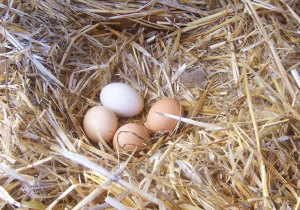What came first, the chicken or the egg?!
The chicken vs. egg debate dates back to some time between the years 45 and 120, during which Plutarch, a Greek and Roman historian and philosopher, lived. This age-old question you are dying to know the answer to can be and has now been backed up with science.
First, some rules need to be addressed in order to avoid hasty answers. If you think you can get away with saying, “The egg came first because dinosaurs laid eggs long before chickens even existed,” well, you can’t. For clarity, we’ll rephrase the question –
“What came first, the chicken or the chicken-egg?” where the chicken-egg refers to eggs from which only chickens are born.
Without science, this question becomes a cycle. If the chicken-egg came first, where did it come from? A chicken must’ve laid it; therefore, the chicken would have come first. Or, if the chicken came first, it must’ve hatched from an egg; therefore, the egg would have come first. But then didn’t a chicken lay that egg? And didn’t an egg hatch that chicken?! This cycle seems inescapable, but we can use science to get us through.
Those who argue for the side of the chicken making the first appearance lean on a protein called OV-17. This protein, research suggests, is essential in the formation of chicken-eggs, and it only comes from chickens’ ovaries. Therefore, it would only make sense that the chicken came first. Right?
Well, those on Team Egg would beg to differ. In nature, organisms evolve through small changes in DNA that occur overtime. As DNA replication is never completely accurate, mutations, which occur in the zygote of cells, continue to appear gradually as more DNA is replicated through more generations. (This zygote, vaguely speaking without too much biological jargon, is essentially the beginning of the developing individual produced from the two parents). Mutations don’t impact the resulting organism or its DNA for a long time, but they are enough to be the starter of a new species. This means that way back when chickens first lived, they originated from chicken-like animals, which we’ll call non-chickens. One non-hen laid an egg that a non-rooster then fertilized. And from the genetic mutations in the DNA of their egg’s zygote came a chicken! Since this chicken came from an egg, it must’ve been a chicken-egg, showing that the egg came first. Right?

But wait. Someone from Team Chicken might counter that this chicken was just growing inside of its parents’ non-chicken egg; however, due to the gradual impact of mutations and evolutionary occurrences, that cannot be.
So, to wrap up, here are the two claims: For the chicken to have come first, two non-chickens mated, which led to a non-chicken egg being laid. In this said non-chicken egg, a mutation caused the offspring to be a chicken, which then went on to lay chicken-eggs. Here, the chicken technically came first because it came from the egg of non-chickens. And for the egg to have come first: a true chicken came from a chicken-egg which came from non-chickens.
Here’s another way to look at it: two non-chickens mated, whose DNA was mutated over time, and produced a zygote. Because mutations only have effects at the original point (at/where a new zygote is created), the two non-chickens that mated produced a zygote. And in it, this zygote contained mutations that produced the first non-non-chicken (chicken). Because mutations that cause speciation only have effects at the zygote, the egg must’ve come first, as the zygote is housed in the egg. So, the mutation that caused the first chicken is in the egg. From the egg, came the chicken.
Ultimately, it comes down to your definition of an egg. However, in each argument, the chicken still came from an egg, regardless of the semantics. So, then, we can all agree. Which came first, the chicken or the egg?!
THE EGG!

This is a great article, Rebecca! I had always just assumed that the egg had come first (because of mutations), and I never considered that the mutations could occur after the egg had been laid. Now, a question for you. What came first – the phoenix or the flame? The answer that’s written into Harry Potter is that “a circle has no beginning,” but after reading your article, I’m leaning towards the flame. While it seems ridiculous to assume that a mythical creature has DNA, it seems more ridiculous to assume that such DNA can mutate AFTER it’s already in place. Your opinion?